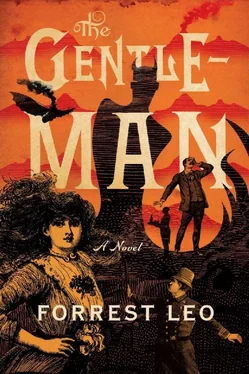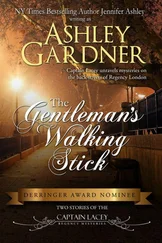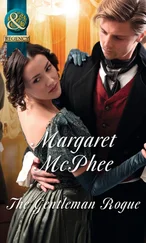I follow, gasping for breath.
Though I was only gone a few hours, the flying machine looks much better. The broken wing is mended, the tail is stripped of its muddy tatters and is ready to be skinned, and the hull has been patched in several places. Simmons and Lizzie are here and appear quite at home. Simmons uses a rag to polish the dull metal of the engine to a gleaming brass, and Lizzie is bent down next to Kensington, who tinkers with knobs and dials on the bridge, recalibrating something or other.
They all look up as Lancaster and I enter. ‘Look what I found!’ announces Lancaster, dropping the bundle on the floor. He looks pleased to be quit of it, which makes me pleased.
‘Oh look,’ says Lizzie, still angry with me for forgetting her, ‘it’s a Lionel. How nice.’
‘The machine looks better,’ I say.
‘Oh yes!’ says Kensington. ‘Yes, I daresay it does! Your family has been very helpful, Mr Savage. Miss Savage reminds me ever so much of Thomasina. When this is all over, you all must come to stay with us at Kellwick House.’
My previous frustration with him has vanished, and I have decided that I can live with his deferential demeanour if he can live with my callous one. ‘Yes,’ I say. ‘That sounds— That sounds very nice. I would like that.’ Friendship. What a peculiar thing.
Re-skinning the tail turns out to be difficult. The canvas has to be stretched tight as a drum or the craft will upset; so it is necessary first to cut the cloth precisely, then to stitch it together in a very specific pattern — all the while ensuring that it will fit over the existing frame, and that the stitching will not pull out even in extreme circumstances. (That is what happened when Kensington crashed.)
It is mid-afternoon by the time the tail is in working order. My fingers are bloody where I have pierced them with the needle, and my thumbs are bruised where I have smashed them with the hammer. (Tacking on the canvas was worse than sewing it together — I gained a new appreciation for upholsterers.) I have hit my head no fewer than three times walking under the wings and failing to duck properly, and one arm of my coat is ripped from catching it on a lever as I passed by.* But my heart is full, and I am happier than I can recall being in a very long time.

I may not have any native aptitude for it, but I believe I could learn to love the life of an adventurer. I mention something to that effect aloud, and Lizzie laughs at me and Simmons keeps a carefully straight face — but Kensington grins, and Lancaster claps me on the back, so I think I cannot be exclusively an object of mockery.
At around half past three Kensington announces that repairs are complete and it is time for a test flight. Together the five of us haul the flying machine out of the barn. This may sound simple, but it is not. The machine weighs several tonnes* and is very difficult to move. Here is how we do it. Kensington attaches a rope to the craft’s prow (does one call the front of a flying machine a prow?)* and Lancaster ties the free end around his chest. We remaining four clap on to the rope behind him, and at his count we all pull together.
When the machine is out in the open it looks at once even grander and much smaller. The notion that we are going to fly it across the open ocean and into the mouth of a volcano becomes concerning to me in a manner I had not anticipated. The bent wood of its wings, the sailcloth (so sturdy it seemed upon my back!), the little steam engine — they have a magisterial beauty when seen in the afternoon light of a misty moor, but it is the beauty of the miniature. They look too frail to withstand the stormy North Atlantic.
If the others share my dark thoughts, they do not show it — and Will Kensington, at least, is only enthusiasm. He dashes about readying his ship with indomitable good spirits, a model of boundless energy. He pulls a lever, and with a cough, a sputter, and a hiccough of smoke, the engine starts. Another lever, and the wings begin to move up and down slowly, as if the machine is waking from a long sleep. Kensington cries out triumphantly, and the rest of us applaud the young inventor.
Leaving the engine to warm up, he hops down from the ship. ‘I believe it works,’ he says with modest restraint.
‘I hope so,’ says Lizzie, ‘because I’m coming with you!’
‘On the test flight?’ says Kensington. ‘Oh, Miss Savage, I hope you do not think me impolite to refuse you — but it’s entirely too dangerous.’
‘ You’re going,’ says Lizzie stubbornly.
‘Well, yes,’ says Kensington. ‘Someone has to fly it. But in the event of a crash it would be very silly for more of us to be killed than is absolutely necessary.’
‘Hm,’ says Lizzie. ‘Yes, that’s true. Simmons, Ashley, Nellie — I regret to inform you that the three of you must remain on the ground, as your presence aboard is not absolutely necessary.’
‘Lizzie,’ I say.
‘ARE YOU GOING TO ARGUE WITH ME, LIONEL SAVAGE?’
I see it is hopeless. ‘No,’ I say meekly.
‘Captain Kensington,’ says Lizzie, ‘I declare myself your first mate.’
I shudder at the double entendre.
‘Now hold on a minute,’ objects jealous Lancaster. ‘You can’t just—’
‘It would be a shame, Mr Lancaster,’ says Lizzie stiffly, cutting him off, ‘for our acquaintance to end scarcely before it has begun — would it not?’ I have said already that Lizzie is more persuasive than a loaded gun.
‘It would,’ he concedes, and says no more.
Kensington looks to me for guidance, but it is obvious that we are all quite helpless before her. He shrugs and holds out a gallant hand, which she takes.
Before they can climb aboard the airship and disappear into the sky, however, something unexpected happens. Scotland Yard arrives, and we are all arrested for anarchists.

Fourteen In Which Scotland Yard Makes a Mistake & I Am Glad to See Whitley Pendergast
Lo! From the ground— Lo! Rising to the sky!
What is this thing which climbs upon the breeze—
Which rides the back of clouds like Arion
Upon his dolphin, ever higher, ever
More wonderful? My friends, I’ll tell you straight—
’Tis nothing less than Progress manifest.
— From ‘The Skyship,’ by WHITLEY BARNABAS PENDERGAST*
More accurately, Scotland Yard arrives and tries to arrest us.
It happens like this. Lancaster is preparing to boost Lizzie into the machine when there is a shout and a gunshot. We look east and see a dozen police officers swarming up the neighbouring rise. Now I must here state that, despite the questionable nature of my mental activity and pseudonymous writings, I have never in my life been chased by the police. I may say without shame that a thrill shoots through me, and I briefly consider how glorious it would be for us to make a heroic last stand here behind our buttress of ingenuity. But we do not. We haven’t any weapons, firstly, and secondly Simmons counsels against it.*
When we first see the police, they are perhaps a quarter mile distant.
‘Damn!’ says Lancaster. ‘What are they doing?’
‘They can’t possibly be here for us, can they?’ asks Lizzie.
‘I fear they are,’ replies Kensington, his brow furrowed in annoyance. ‘The police have harried inventors these past several years. They must have gotten wind of my machine.’
Читать дальше














